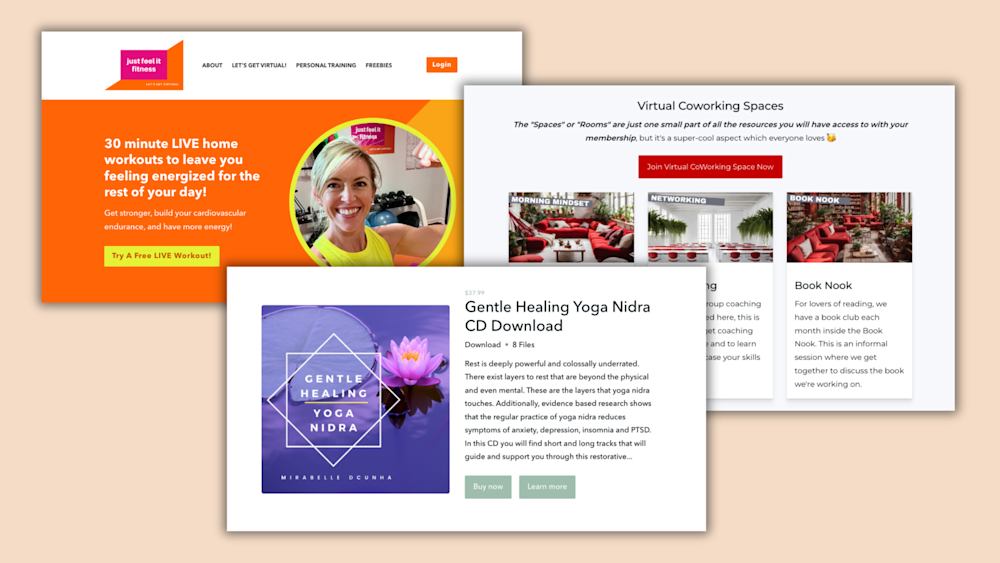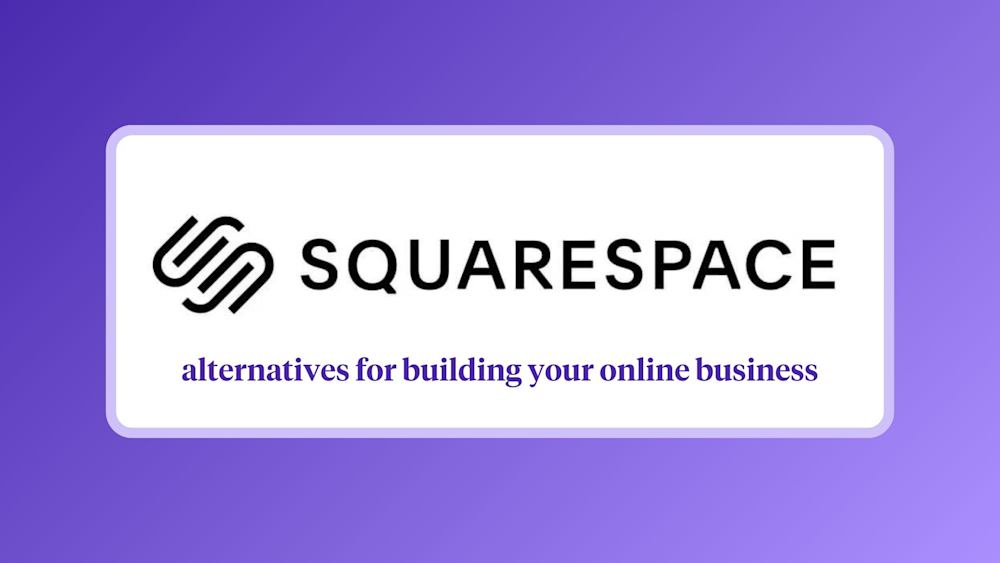Don’t become an entrepreneur.
It’s not for the faint of heart.
Plus, you need extra time, money, and, not to mention, extra energy in life.
Is all that startup umph worth replacing your safe and secure 9-to-5?
Nah . . .
Wait -- I kid, I kid. Well, sort of.
Should you start your dream business? If you want to avoid regret, YES.
Is it going to be a walk in the park? Of course not.
But, we’ve got some helpful tips for you today that should put you on the right track -- and mindset -- for overcoming your fears of starting your own business from home.
More specifically, we bring you five common excuses would-be entrepreneurs make and, more importantly, how to overcome them.
Let’s hop to it.
5 big excuses entrepreneurs make (and how to overcome them)
#1. I don’t know how to start a business
With over 30.2 million small businesses in the United States alone, saying there’s a lack of helpful resources and info to get you started on your own small business would be remiss.
A quick “how to start a business in [your state]” Google query turns up over 452 million results. That’s if you’re in Oregon, as an example.
Regardless of where you live, though, you’ll get, at minimum, millions of helpful hits.
If you’re not up for an in-depth search engine hunt at the moment, here is a resource for starting your business that you can check out right away:
-
The 4 things you need to know to start selling info products online
And that’s just some of our most recent articles.
There’s also Coursera, EdX, and Skillshare, which are great sites that offer free and paid business-related courses to give you a solid foundation as an entrepreneur.
To brush up your marketing skills, HubSpot Academy offers several free courses and certificates that are worth checking out.
You also can’t go wrong with blogs, videos, and other free content from marketing powerhouses like CoSchedule, Content Marketing Institute, and Buffer, either.
More of an in-person learner? Check out your city’s chamber of commerce or SCORE chapter to see if they offer basic seminars -- most do so at least monthly.
Another face-to-face option is to connect with other entrepreneurs and professionals who have started the journey you’re about to embark.
Entrepreneur Jenna Kutcher, for example, reached out to a local accountant for information about the legal and financial sides of starting her business.
And Adam G. Force, likewise, talked to several experts in his field about the feasibility of his product idea before deciding to pursue his different ideas.
The point here is this:
There’s an abundance of resources for you to tap that will help you launch your own business, or, at the very least, a side-hustle to start while you keep your 9-to-5. If you don’t know how to start a business, there are resources and people that can quickly help you learn how.
Of course, it doesn’t do you any good to know how to start a business if you don’t have any good product ideas, right?
Actually, not really. Let’s debunk that idea next.
#2. I don’t have a good product idea
The good news here is you don’t need a unique idea to start your business.
In fact, preexisting ideas and businesses mean there’s a healthy market that’s willing to pay for what you want to sell. Put another way, crowded markets equal lots of customers.
So, competition can be a good thing.
What you do want to make unique is your own branding.
You can stand out from your competition by putting your own spin on your business and follow best practice branding to make it uniquely yours.
And there’s no better way to be unique in your brand than to be authentic. After all, 91% of consumers prefer to buy from an authentic brand, and 86% of consumers want brands to be authentic and honest in their social media personalities.
But OK. Branding aside, let’s say you’re falling short on business ideas in general.
All it takes is some solid brainstorming and a bit of research.
If you’re stuck for ideas, consider your own frustrations and concerns, read the news, talk to your friends, or peruse customer reviews from the websites where you most frequently shop.
By taking a little contemplation time, you might be surprised at what you learn about customer concerns and the ideas they spark.
The founder of Casper mattresses, Philip Krim, for example, started the brand when he saw there were only two major mattress brands on the market. To Philip, he took it as a signal that there’s a big opportunity for innovation and disruption.
In the same vein, Venmo started when one of the co-founders forgot his wallet but didn’t want to pay Venmo’s other co-founder back by check or PayPal.
So, give it some thought, and don’t let the potential competition scare you. If there’s competition, there’s an opportunity to make yourself stand out.
Plus, once you have your ideas laid out, you can battle test your first products with a beta audience.
For instance, you can create a product prototype to see how well people respond, and then iterate and improve your idea over time.
This is where effective customer research comes in, where you take feedback from your beta customers and use it to turn your initial product idea into something that’s killer on the market.
Back to our Venmo example, this is exactly what they did when they first started.
If you think the fancy app that it is today is how the mobile payment giant looked back then, think again. Venmo started as a basic service provided over SMS.
Likewise, top shoe-selling site, Zappos, started with founder Nick Swinmurn posting images of shoes on his website, and then buying those shoes from local shops after customers ordered them on Zappos.
Venmo and Zappos are just two examples of wildly successful product ideas that started from formats that look starkly different than they do today.
The main takeaway is to spend some time brainstorming ways to solve problems for people. If a product idea already exists, it’s a good thing. Competition means there’s a healthy demand for that idea.
You can differentiate your idea through unique branding, and then beta testing and conducting customer research to improve your idea, so it’s even better than the competition.
And if you’re still having trouble drumming up product ideas, here are some online business ideas, unconventional side business ideas, and online product examples to get your imagination going.
Is all this work harping on your need for more time? Then read our next excuse.
#3. I don’t have enough time
The third common excuse that would-be entrepreneurs make too often is not having enough time to launch a business.
If you work a 9-to-5 and have most of your week blocked out by making another brand more revenue, I get it. You feel strapped for time.
But, you don’t need to quit your job to start a business. You just need to better manage and prioritize the time you do have available.
Given that Americans spend an average of 5.19 hours per day on sports and leisure, there’s likely some wiggle room in your pre- and post-job hours that you can dedicate to becoming an entrepreneur.
The key is in mapping out your time more intentionally and committing to working on specific tasks in building your business.
Entrepreneur Austin L. Church’s way of calculating how much time it takes to squeeze in launching an online course, for example, goes a little something like this:
-
Figure out how many phases your course includes (i.e., planning, writing lessons, editing, recording lessons, et cetera).
-
Estimate how many 1-hour blocks you have available each day (don’t forget break days).
-
Count the discreet 1-hour blocks you will need.
-
Take the total and multiply it by 1.5
You can follow in Austin’s footsteps and break out the exact tasks needed to start your business, and clearly assign time in your week -- including a 50% buffer -- to complete them.
Another way you can go about better using your time is to swap out unproductive time for productive time. Here’s what I mean.
Commuting to work? Turn your ride into an entrepreneurial university on wheels and listen to podcasts and shows with educational content that motivates you to spearhead your first business venture.
A handful of my faves are:
-
Smart Passive Income with Pat Flynn
-
Impact Theory with Tom Bilyeu
-
Marie Forleo’s MarieTV
-
The School of Greatness with Lewis Howes
-
The Tim Ferriss Show
Or, if you’re someone who cruises social media daily -- basically, that means everyone -- swap out some of that time sink with working on your business.
Really. With 144 minutes per day being the average time spent on social media, there’s bound to be some time you can spend working on your business.
No matter how you dice your week, the trick is to be more intentional with the time that you do have and reserve some time to work on starting your business.
Whether it’s consuming helpful info or tackling tasks, there’s bound to be blocks of time that you can spend more wisely and work toward becoming an entrepreneur.
Typically, having enough time is only half the battle. Its evil twin -- cash flow -- is the other half, which brings us to our next excuse today.
#4. I don’t have enough money
Another classic excuse that nicely complements the last one is not having enough funding to start a business.
Contrary to what you might think, you can get started without tens of thousands of dollars in hand or the grace of an angel investor.
In fact, 64% of small business owners start with less than $10,000, and another 33% of them start with less than $5,000.
To find out how this is possible, let’s get into some specific expenses.
For a business website, you can create a functional and visually-appealing site for as little as $9 per year with Carrd.
Email marketing tools, which are vital for collecting and sending emails to nurture sales, cost as little as $9.99 per month with Mailchimp, and a little more for tools like AWeber, ActiveCampaign, or ConvertKit.
Once you have products ready to sell, you’ll also need a product page to sell them from.
WordPress offers hosting and near-limitless customization, personalization, and features for as little as $300 a year.
The downside is WordPress can require paid themes, multiple expensive plugins, and hours of regular maintenance to keep running.
Fortunately, there’s a WordPress alternative.
Podia is a more affordable and low-maintenance option for creators who want to focus on bringing their products to life and not organizing their websites.
I may be biased here, but the true beauty in Podia is that it also comes with built-in email marketing, live chat messaging for your customers, sales pages, and the ability to sell an unlimited number of digital products.
And these are just some of the perks.
Basically, it’s a streamlined way to run your site business. You can try out all the perks with this 30-day, no-hassle free trial today.
Although it can be difficult to spend on your business before you start making sales, investing in the right tools helps attract more customers and sales from the get-go.
And the sooner you have the right tools in your bag, the sooner you can stop worrying about how you’re going to generate more income and start actually generating it.
That’s the point, isn’t it? After all, among the many reasons why side hustlers start their businesses, 22.8% of them want to diversify their income in case of a layoff, and 65.9% want more spending money.
On top of that, 54% of business owners say they earn more after being self-employed, and online business owner Sireesha Narumanchi claims that starting a side-hustle increased her financial stability, among other benefits.
The gist of it is:
To create products that your customers will love, you’ll need to spend some money on developing and marketing them. Once you get a good system started for attracting your customers, your revenue will roll in and more than cover your startup costs.
Which, by the way, you should be able to cover without breaking the bank.
Breaking your self-esteem is another topic, bringing us to our final excuse today.
#5. I’m afraid of failing
Would-be entrepreneurs are also afraid of failing and too often let the excuse of fear of failure get in the way of starting their business.
Here’s a perspective shift to consider: Failing is a good thing.
Hear me out. When you look at failure as a setback rather than a total loss or reason to give up, it’s full of learning lessons.
Missteps aren’t as bad when you put them into perspective and see them as a smaller -- and necessary -- part of the big picture goal.
In fact, a lot of big brands go into new projects and create new products by intentionally experimenting and expecting to fail.
These days, giants like Google, LinkedIn, Bing, and Microsoft run over 20,000 controlled experiments each year.
With that many experiments running, they’re bound to strike gold on at least a few good hits.
As author Mike Moran said in his book, Do It Wrong Quickly:
“If you have to kiss a lot of frogs to find a prince, find more frogs and kiss them faster and faster.”
The point is when you treat your endeavors like an experiment, you train yourself to expect failures to get to the wins.
If big brands can accept losses from their experiments as a necessary path to winning business ventures, so can you. (Of course, on a smaller scale to start.)
And if experimenting hasn’t convinced you to embrace failure, try another perspective.
Put into terms of venture capitalist and founder of Y Combinator Paul Graham’s Startup Curve, failure is part of a standard phase called the “trough of sorrow”.
It happens right before your business is headed upwards toward scaling and growth.
So, if you consider failure to be part of the “experimenting and pivoting” stage in Paul’s “trough of sorrow,” you might be able to build resilience and look toward the growth ahead.
Plus, resilience is really the magic that keeps you from ultimately failing in the bigger (more important) picture and stands as a strong survival trait for startup entrepreneurs.
After all, you can’t build resilience with smooth sailing, and a path with no ups and downs teaches you nothing, so you may as well face failure head-on, snatch the learning lessons, and push onward to improving your business ideas until they flourish.
Combat these excuses entrepreneurs make and start your dream business
There’s no sugar-coating it: Starting your own business is not going to be easy.
But can you do it? And should you do it?
Absolutely.
Start by conquering these five common excuses would-be entrepreneurs make:
-
#1. I don’t know how to start a business. There are countless resources and heaps of people who have been there before you to help you learn your next steps.
-
#2. I don’t have a good product idea. Conduct market research and vet your ideas with beta clients. Then iterate and uniquely brand your product ideas to make them better than the competition.
-
#3. I don’t have enough time. Be more intentional with your available time and block out chunks to complete specific tasks and make progress toward starting your business.
-
#4. I don’t have enough money. You don’t have to have tens of thousands to start your business, just enough to kickstart some marketing and key tools.
-
#5. I’m afraid of failing. Change your perspective to embrace failures as necessary learning lessons and chances to pivot and improve your business, so it’s best fit for the market and primed for growth.
You got this. And, as always, we’re in your corner.



